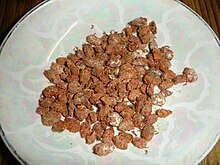
Back الطب العربي اليوناني Arabic ইউনানি Bengali/Bangla Unani German Medicina unani Spanish طب یونانی Persian Yunâni French यूनानी चिकित्सा पद्धति Hindi ユナニ医学 Japanese იუნანის მედიცინა Georgian ಯುನಾನಿ ವೈದ್ಯ ಪದ್ಧತಿ Kannada
| This article is part of a series on |
| Alternative medicine |
|---|
 |

Unani or Yunani medicine (Urdu: طب یونانی tibb yūnānī[1]) is Perso-Arabic traditional medicine as practiced in Muslim culture in South Asia and modern day Central Asia. Unani medicine is pseudoscientific.[2][3] The Indian Medical Association describes Unani practitioners who claim to practice medicine as quacks.[4]
The term Yūnānī means 'Greek',[5][6] referring to the fact that the Perso-Arabic system of medicine was based on the teachings of the Greek physicians Hippocrates and Galen.[7]
The Hellenistic origin of Unani medicine is still visible in its being based on the classical four humours: phlegm (balgham), blood (dam), yellow bile (ṣafrā) and black bile (saudā'), but it has also been influenced by Indian and Chinese traditional systems.[8]
- ^ the transcription as Unani is found in 19th-century English language sources: "the Ayurvedic and Unani systems of medicine" "Madhya Pradesh District Gazetteers: Hoshangabad", Gazetteer of India 17 (1827), p. 587.
- ^ Quack, Johannes (2012). Disenchanting India: Organized Rationalism and Criticism of Religion in India. Oxford University Press. pp. 3, 213. ISBN 978-0199812608.
- ^ Kaufman, Allison B.; Kaufman, James C., eds. (2018). Pseudoscience: The Conspiracy Against Science. MIT Press. p. 293. ISBN 978-0-262-03742-6.
- ^ Aggarwal, K. K.; Sharma, V. N. "IMA Anti Quackery Wing". Indian Medical Association. Retrieved January 7, 2024.
Quacks can be divided amongst three basic categories ... Practitioners of Indian Medicine (Ayurvedic, Sidha, Tibb, Unani), Homeopathy, Naturopathy, commonly called Ayush, who are not qualified to practice Modern Medicine (Allopathy) but are practicing Modern Medicine.
- ^ William Dalrymple (1994). City of Djinns: A Year in Delhi. Flamingo. p. 269. ISBN 978-0-00-637595-1.
- ^ "Unani Tibb". Science Museum, London. Retrieved 7 October 2017.
- ^ "Unani Medicine in India: Its Origin and Fundamental Concepts" by Hakim Syed Zillur Rahman, History of Science, Philosophy and Culture in Indian Civilization, Vol. IV Part 2 (Medicine and Life Sciences in India), Ed. B. V. Subbarayappa, Centre for Studies in Civilizations, Project of History of Indian Science, Philosophy and Culture, New Delhi, 2001, pp. 298-325
- ^ Heyadri, Mojtaba; Hashempur, Mohammad Hashem; Ayati, Mohammad Hosein; Quintern, Detlev; Nimrouzi, Majid; Mosavat, Seyed Hamdollah (2015). "The use of Chinese herbal drugs in Islamic medicine". Journal of Integrative Medicine. 13 (6): 363–7. doi:10.1016/S2095-4964(15)60205-9. PMID 26559361.